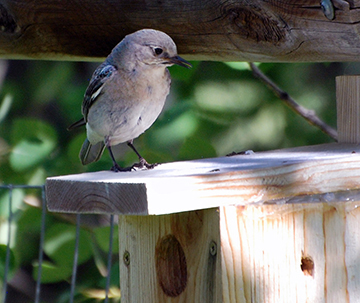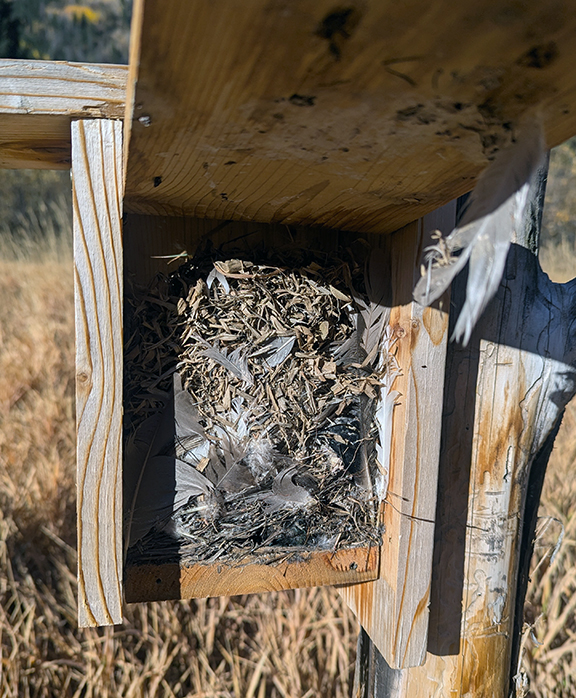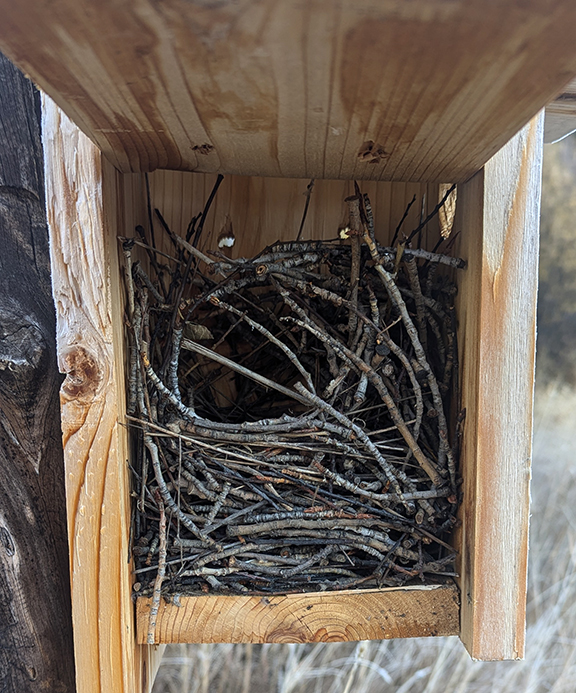Open Space housing effort for the birds

A female, or perhaps juvenile, Mountain bluebird making use of a birdhouse at Glassier Open Space.
Ten new birdhouses. Six nests.
A year ago, Pitkin County Open Space and Trails built and placed 10 bluebird houses on a couple of open spaces. We targeted Mountain bluebirds, a species that has historically nested in tree cavities excavated by woodpeckers, but that will readily use a nest box that is appropriately sized and properly placed in their natural habitat.
In fact, according to the Cornell Lab’s All About Birds, most of what ornithologists know about Mountain bluebirds comes from studying them at human-made nest sites.
All nest boxes were installed in pairs, with the two houses placed 10 to 20 feet apart. Six nest boxes were installed at North Star Nature Preserve and another four debuted at Glassier Open Space. Both properties contain habitat that meets the bluebirds’ foraging and nesting needs. In addition, two existing but deteriorating birdhouses at Filoha Meadows Nature Preserve were replaced. Recently, we checked all of the boxes to assess our success at attracting birds and to clean them out in preparation for breeding season next spring (birds generally prefer to build a new nest each year).
Rewardingly, a number of the boxes contained nests. Figuring out what species took up residence based solely on the nest construction, however, is better left to experts (not us, in other words). While we hoped for bluebirds, other welcome nesters that could have benefited from the nest boxes include the Tree and Violet-green swallow, Ash-throated flycatcher and House wren.
First, a bit about birdhouse placement: Putting up pairs of boxes is the recommended strategy for accommodating Mountain bluebirds. Other birds – swallows, for example – may outcompete bluebirds for a single birdhouse, but are OK with bluebirds as neighbors. Neither species will tolerate another breeding pair of their own kind right next door, but swallows and bluebirds can nest in close proximity to one another. Hence, two boxes are better than one.
At North Star, two pairs of boxes each contained nests built this summer. At one site, one nest was pretty much all twigs – a hallmark of the House wren – and the other was a mix of twigs and grass, with a lot of feathers left about. House wrens are very territorial, don’t tolerate other wrens and are aggressive toward other species attempting to nest nearby, according to the literature.
Elsewhere at North Star, another pair of boxes each boasted healthy nests of grass and feathers. One nest filled a bit less than half the height of the box; the other one was crammed practically to the ceiling. Bluebirds do construct nests with dry grass and other vegetation. It is possible that at least one of these boxes was occupied by Mountain bluebirds.
The third set of boxes at North Star went unused. Both birdhouses at Filoha were unoccupied, as well.
At Glassier Open Space, on-the-ground observations during nesting season provided far better clues than the detritus left in the boxes. We observed Tree swallows occupying one box this summer. The adjacent birdhouse contained a barely started nest of woven cheatgrass; the builder apparently abandoned the effort early on. The swallows, meanwhile, built a nest consisting of several inches of woven grass, lined with feathers. They left behind plenty of droppings, as well.
The second pair of nest boxes at Glassier provided us with a confirmed pair of nesting bluebirds. We observed the male bringing food to the box on several occasions. Surprisingly, when we opened the box we found a rather insubstantial nest of grass that was barely over an inch in height. Still, there were bits of pale blue eggshells inside! The birdhouse next door was vacant, but for an expired bumblebee and a small, dead wasp.
Conclusions: We’re encouraged by the effort to attract bluebirds and may have to construct a few more birdhouses. Our efforts provided other species with a home, as well. We’ll be keeping close watch next year!
Thanks to Roaring Fork Audubon for providing advice on this project. This organization offers instruction on constructing bluebird houses (the specifications are quite exact) for those interested in attracting bluebirds.
– By Pitkin County Open Space and Trails.

A North Star birdhouse, filled to the brim with nest material.

This twig-built nest was probably the work of a House wren.
